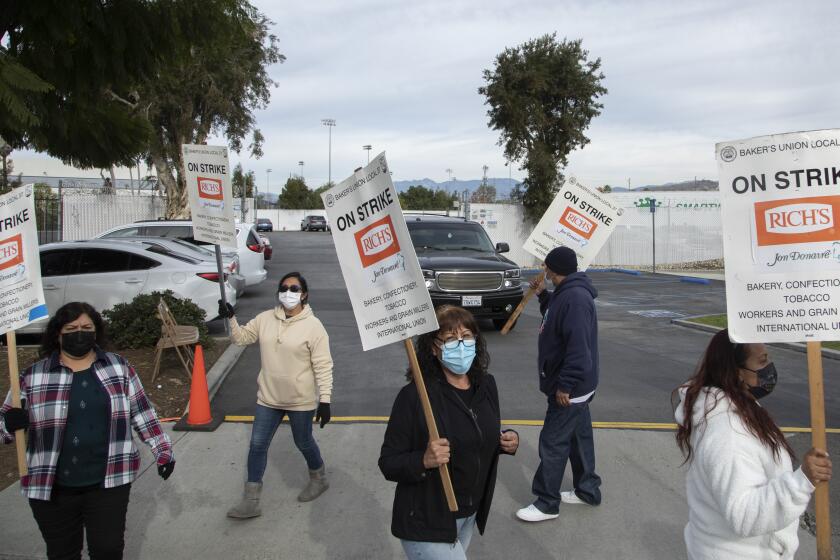Column: When a medical team quit, this hospital sued to force them to keep working

- Share via
It’s hardly a secret that American labor law and workplace practices are designed for the benefit of employers, not workers.
But a Wisconsin hospital tried to break new ground in the field by suing to stop a team of seven healthcare workers from quitting their jobs and taking posts at another hospital.
Over the weekend, the workers were in limbo. Outagamie County Circuit Court Judge Mark McGinnis had granted the former employer’s request for a temporary injunction preventing the workers from taking up their new jobs. But he didn’t order them to keep working at their original jobs.
To me, that is a poor result for everyone involved.
— Wisconsin County Judge Mark McGinnis, blocking the movement of healthcare workers to a new hospital
On Monday, after a hearing at which some of the workers were scheduled to testify, McGinnis lifted the injunction, leaving the workers free to take up their new posts.
In issuing the injunction Friday, McGinnis had acknowledged that keeping the seven workers off duty is far from ideal. “To me, that is a poor result for everyone involved,” McGinnis said.
Get the latest from Michael Hiltzik
Commentary on economics and more from a Pulitzer Prize winner.
You may occasionally receive promotional content from the Los Angeles Times.
He asked the two employers to work out a deal between themselves, but that didn’t happen.
The conflict involved seven members of an 11-member cardiovascular team providing urgent care to stroke victims at ThedaCare Regional Medical Center in Neenah, Wis., about an hour south of Green Bay.
ThedaCare says that when the workers, who include technicians and nurses, all took jobs at nearby St. Elizabeth Hospital, that impaired its ability to provide round-the-clock care for stroke patients, who might have to be transferred to hospitals in Green Bay or Milwaukee, even farther away. St. Elizabeth is operated by Ascension, a 142-hospital national Catholic healthcare system.
A nearly three-month strike shows the determination of low-wage factory workers.
ThedaCare’s application for an injunction accused Ascension of an effort to “poach” the workers. The institution said in a statement that Ascension refused to work out a transition timetable. ThedaCare sought the injunction to “provide time” to replace the workers.
Ascension said in a statement that it “did not initiate the recruitment of the ThedaCare employees,” but that they applied for posted job openings. “It is Ascension Wisconsin’s understanding that ThedaCare had an opportunity but declined to make competitive counter offers to retain its former employees.”
According to the Appleton Post-Crescent, that conformed with the assertions of Timothy Breister, one of the workers, who told McGinnis by letter that Ascension had job openings that were better “not just in pay but also a better work/life balance.”
The seven workers say they all applied on their own initiative. They asked ThedaCare to match the offers, but ThedaCare declined, stating that “the long term expense to ThedaCare was not worth the short term cost,” Breister wrote. (I couldn’t reach Breister to confirm the report.)
Despite McGinnis’ decision to lift the injunction, it’s proper to observe that ThedaCare’s court complaint and the temporary injunction turned the concept of “at-will” employment on its head.
The prevailing legal principle governing nonunion employment, “at-will” simply means that an employer can fire a worker for almost any reason. The few exceptions apply to firings reflecting illegal discrimination or in retaliation for complaints about illegal activities, discrimination or harassment, among a handful of other protections.
The at-will principle originated in the 19th century, when craft workers valued their independence and the right to negotiate the sale of their skills to employers as equals. By the 1920s, it had become a millstone around the necks of workers — especially less-skilled workers — because of the power it gave employers to treat them as interchangeable warm bodies.
Unemployment benefits didn’t keep Americans from returning to the workforce, since they’re still not clamoring for lousy jobs even after those payments have expired.
McGinnis’ injunction gave ThedaCare even greater power than that — the power to prevent employees from leaving their jobs. In effect, it undermines the free market for worker skills by absolving ThedaCare of the need to counter Ascension’s offer.
Ascension essentially set the going rate for technical expertise in stroke care by offering the workers more than they were earning at ThedaCare and with better hours. (Ascension, unlike ThedaCare, doesn’t run its stroke services around the clock.)
ThedaCare didn’t choose to meet that rate. Instead, it sought sympathy from the court by complaining about how Ascension’s hirings, “at the height of a pandemic surge, will disrupt access to critical care for the people in our region.”
The injunction acted as a judicial version of a “noncompete” clause, which allows employers to bar their workers from moving to a putatively rival business. In a few states, including California, noncompete clauses are unenforceable; in others, they’ve been imposed on professional employees and even fast-food workers.
They may be on their way out nationwide, however, as President Biden last year issued an executive order directing the Federal Trade Commission to consider regulations banning any practices that impede worker mobility. The FTC has begun the process.
The at-will principle, meanwhile, has eroded during the pandemic as workers take it upon themselves to search for greener employment pastures. Voluntary separations, or “quits,” rose in November to 4.5 million, the highest figure recorded by the Bureau of Labor Statistics and one that reinforced the impression that the U.S. is undergoing a “great resignation.”
The ThedaCare workers plainly were participating in the Great Resignation. It’s a measure of how ill-equipped employers have been to deal with it that ThedaCare thought it had no option other than to ask a judge to force them to stay.
More to Read
Get the latest from Michael Hiltzik
Commentary on economics and more from a Pulitzer Prize winner.
You may occasionally receive promotional content from the Los Angeles Times.













